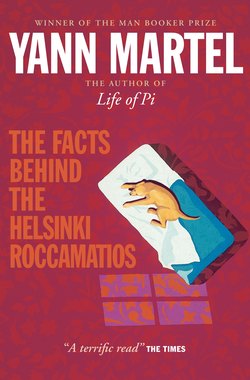Читать книгу The Facts Behind the Helsinki Roccamatios - Yann Martel - Страница 4
На сайте Литреса книга снята с продажи.
Author’s Note
ОглавлениеWhen I was in my second year of university, aged nineteen, my studies ground to a halt. Just as the curtain was lifting on my adult life, with promises of untold freedom, what I might do with that freedom began to trouble me. I had always expected academic degrees—a bachelor’s, a master’s, a PhD—to be the banister that would steady me up the steps of my successful life. But that year I stared at paragraphs of Immanuel Kant in a state of dumb incomprehension, I failed two courses and the banister fell away. The view gave me vertigo.
One consequence of this youthful existential crisis was my first creative effort, a one-act play I wrote over the course of three days. It was about a young man who falls in love with a door. When a friend finds out, he destroys the door. Our hero promptly commits suicide. It was, without question, a terrible piece of writing, irredeemably blighted by immaturity. But I felt as though I’d come upon a violin, picked it up and brought bow to strings: the sound I made was perhaps terrible—but what a beautiful instrument! There was something deeply compelling about creating a setting, inventing characters, giving them dialogue, directing them through a plot, and by these means presenting my view of life. For the first time, I had found an endeavour into which I was willing to pour all my energies.
So I wrote. I wrote another play—an absurdist pastiche, awful—before switching to prose. I wrote short stories—all of them bad—before writing a novel—equally bad—and then more short stories—none of them good. To pursue the violin analogy, I drove the neighbours crazy with my bad playing. But something drew me on. It’s not that I saw a future in it; to think there was a link between my scribblings and books on shelves was preposterous. I didn’t think I was wasting my time when I wrote—it was too exciting—but nor did I think I was building a life. The fact is, I wasn’t thinking at all; I was just doing, madly, like Paganini (without the talent).
Slowly, however, by dint of practice, I got better. Here and there I struck a beautiful note. My developing sense was that the foundation of a story is an emotional foundation. If a story does not work emotionally, it does not work at all. The emotion in question is not the point; be it love, envy or apathy, so long as it is conveyed in a convincing manner, then the story will come alive. But a story must also stimulate the mind if it does not want to fade from memory. Intellect rooted in emotion, emotion structured by intellect—in other words, a good idea that moves—that was my lofty aim. When such an emotive idea came to me, when the spark of inspiration lit up my mind like a bonfire, the charge was like nothing I’d ever felt.
I got my inspiration anywhere and everywhere. Books. The newspaper. Movies. Music. Daily life. People I met. Memories and experience. And also from that mysterious creative ether whence ideas just popped into my head, unheralded. I put myself in a state of receptivity to stories. My eyes and ears sought them. I looked out, not in; in bored me. I did research with pleasure. Research was my way of learning, my own private university. Nothing delighted me more than to investigate the world for the sake of a story.
Meanwhile, I lived with my parents. Or, to be more accurate, I lived off my parents. I paid no rent, ate their food. I did short-term work—tree planting, dishwashing, working as a security guard—never letting these jobs get in the way of my pen. That I was doing nothing credible to ensure my future did not worry me (or my parents, thank God for them: all artists need patrons) because, to give just one example, I had a long story in mind—it might even be called a novella—“Helsinki” for short. It was inspired by the death of a friend from AIDS. The title was unwieldy, the premise was awkward, the development was cumbersome. But there was life in it, the kind of life you find in a newborn child, in an exalted violin solo, the kind that makes everything fresh and hopeful and worth all the work. With that kind of life wriggling in my hands, how could I possibly worry about a bed and a pension for my senior years?
I sent stories out. Once I sent sixteen different stories to sixteen different literary reviews. I received sixteen rejections. Another time, it was nineteen stories to nineteen literary reviews. Two were accepted. That’s a success rate of 5.7 percent. No matter. I would soldier on with my writing until something else came up. Nothing did, nothing has—and I’m happy for that.
The four stories in this collection are the best results of my early years as a writer. They did well. They won me some prizes. “Helsinki” was adapted to the stage and to the screen, “Manners of Dying” also to the screen and twice to the stage. First published as a book in Canada in 1993, the collection came out in six other countries. With these stories, the neighbours stopped banging on the walls and instead came over to say “Bravo! Bravo!” It was a thrill for which I was—and still am—grateful.
Ten years on, I’m happy to offer these four stories again to the reading public, slightly revised, the youthful urge to overstate reined in, the occasional clumsiness in the prose I hope ironed out. No doubt I have other stories to tell, but these four will always carry for me the joy and excitement of a world premiere.
